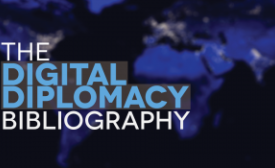diplomacy

The most comprehensive bibliography of digital diplomacy to date.
The French Embassy celebrated Bastille Day in Seoul on Monday with a slew of French and South Korean businesses, while reflecting on its growing diplomatic and cultural relations with Korea. Bastille Day, or “La Fete Nationale,” is France’s National Day and celebrates the storming of the Bastille fortress on July 14, 1789.
When the UK’s Foreign and Commonwealth Office released details of its North Korean programme spending this week, some eyes were immediately drawn to the £287.33 the government paid for rights to show the BBC’s Sherlock at the Pyongyang Film Festival in 2012.

How Brazil is using the World Cup to achieve nation branding and diplomatic objectives.
"Today I ask our space community to make plans for developing a Saarc satellite, a satellite that provides a full range of applications and services to all our neighbours. There is a lot of poverty in the Saarc nations and we need scientific solutions for this," The Indian Express quotes the PM as saying.
Culture can play a crucial role in diplomacy, according to the director general of the Centre for Fine Arts (Bozar) in Brussels. In an interview with New Europe, Paul Dujardin, who also serves as the centre’s artistic director, described culture as a “soft power”.
The recent meeting between Palestinian President Mahmoud Abbas and Israeli President Shimon Peres at the Vatican, as well as the upcoming trip to Albania, shows a Pope putting the Catholic Church firmly back on the global political stage — a reboot of the John Paul II years.
Butterfield’s almost wistful point is clearly rhetorical - but it raises important questions about the way we organize our thoughts on diplomacy, the flows and breaks in its development - even how diplomacy is conducted by constantly evolving states.







